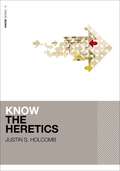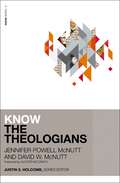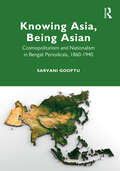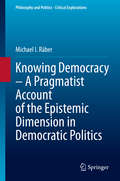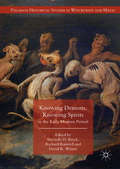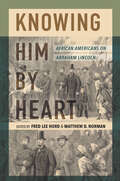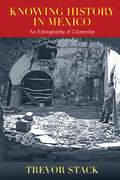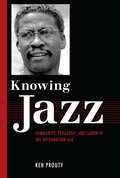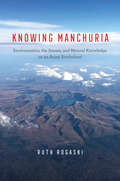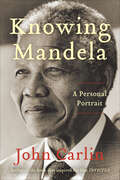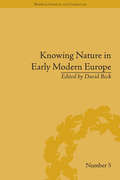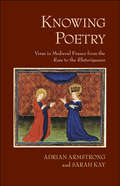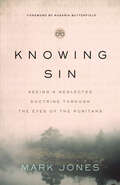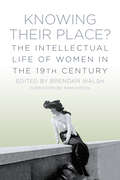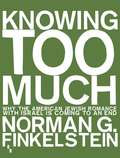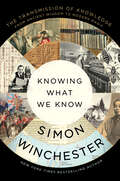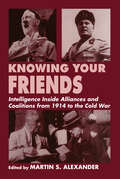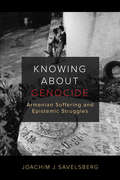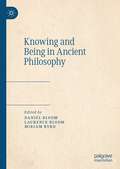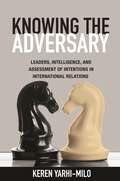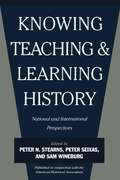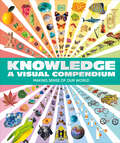- Table View
- List View
Know the Heretics (KNOW Series)
by Justin S. HolcombThere is a lot of talk about heresy these days. The frequency and volume of accusations suggest that some Christians have lost a sense of the gravity of the word. On the other hand, many believers have little to no familiarity with orthodox doctrine or the historic distortions of it.What’s needed is a strong dose of humility and restraint, and also a clear and informed definition of orthodoxy and heresy. Know the Heretics provides an accessible “travel guide” to the most significant heresies throughout Christian history. As a part of the KNOW series, it is designed for personal study or classroom use, but also for small groups and Sunday schools wanting to more deeply understand the foundations of the faith.Each chapter covers a key statement of faith and includes a discussion of its historical context; a simple explanation of the unorthodox teaching, the orthodox response and a key defender; reflections of contemporary relevance; and discussion questions.
Know the Theologians (KNOW Series)
by Jennifer Powell McNutt David McNuttKnow the Theologians is an introduction to the most important thinkers throughout church history and a demonstration of their ongoing relevance for believers today.The Bible describes the church as a kind of family. Those who believe in Christ are sisters and brothers in the faith, whether they live at the same time or are separated by centuries. For that reason, believers today need to know our family members who have come before and shaped our beliefs and practices now. In Know the Theologians, professors and authors Jennifer Powell McNutt and David W. McNutt introduce the most significant thinkers in the church's history.McNutt and McNutt survey over a dozen primary figures, including Eastern Orthodox, Roman Catholic, and Protestant theologians, who represent the breadth and depth of the church's theology. The book explores how they fit into their own time period and also draws attention to the theological voices of women throughout the church's history. Every chapter includes short sidebars on figures contemporary to the main theologians, bringing in additional important voices.This book has everything you need for a full personal or group study experience.As part of the KNOW series, Know the Theologians is designed for either personal study or classroom use, and it will also be an accessible resource for small groups and adult education in churches. Chapters end with reflection questions and recommended reading for further study.An individual access code to stream all video sessions online. (You don&’t need to buy a DVD!)Sessions:PART 1: EARLY CHRISTIAN THEOLOGIANS1. Irenaeus of Lyons2. Athanasius of Alexandria3. The Cappadocian Four4. Augustine of HippoPART 2: MEDIEVAL THEOLOGIANS5. John of Damascus6. Anselm of Canterbury7. Julian of Norwich8. Thomas AquinasPART 3: REFORMATION THEOLOGIANS9. Martin Luther10. John Calvin11. Menno Simons12. Teresa of AvilaPART 4: MODERN THEOLOGIANS13. The Wesley Brothers14. Friedrich Schleiermacher15. Karl Barth16. Gustavo GutiérrezStreaming video access code included.?Access code subject to expiration after 4/2/2029. Code may be redeemed only by the recipient of this package. Code may not be transferred or sold separately from this package. Internet connection required. Void where prohibited, taxed, or restricted by law. Additional offer details inside.
Knowing Asia, Being Asian: Cosmopolitanism and Nationalism in Bengali Periodicals, 1860–1940
by Sarvani GooptuThis book studies the various representations of Asia in Bengali literary periodicals between the 1860s and 1940s. It looks at how these periodicals tried to analyse the political situation in Asia in the context of world politics and how Indian nationalistic ideas and associations impacted their vision. The volume highlights the influences of cosmopolitanism, universalism and nationalism which contributed towards a common vision of a united and powerful Asia and how these ideas were put into practice. It analyses travel accounts by men and women and examines how women became the focus of the didactic efforts of all writers for a horizontal dissemination of Asian consciousness. The author also provides a discussion on Asian art and culture, past and present connections between Asian countries and the resurgence of 19th-century Buddhism in the consciousness of the Bengalis. Rich in archival material, Knowing Asia, Being Asian will be useful for scholars and researchers of history, Asian studies, modern India, cultural studies, media studies, journalism, publishing, post-colonial studies, travel writings, women and gender studies, political studies and social anthropology.
Knowing China
by Frank N. PiekeContemporary China appears both deceptively familiar and inexplicably different. China is a cauldron of forms of entrepreneurship, social organization, ways of life and governance that are at once new and unique, recognizably Chinese and generically modern. In analyzing and interpreting these developments, Frank N. Pieke adopts a China-centric perspective to move beyond western preoccupations, desires, or fears. Each chapter starts with a key question about China, showing that such questions and assumptions are often based on a misunderstanding or misconstruction of what China is today. Pieke explores twenty-first-century China as a unique kind of neo-socialist society, combining features of state socialism, neoliberal governance, capitalism and rapid globalization. Understanding this society not only helps us to know China better, but takes us beyond the old dichotomies of West versus East, developed versus developing, tradition versus modernity, democracy versus dictatorship, and capitalism versus socialism.
Knowing Democracy – A Pragmatist Account of the Epistemic Dimension in Democratic Politics (Philosophy and Politics - Critical Explorations #14)
by Michael I. RäberHow can we justify democracy’s trust in the political judgments of ordinary people? In Knowing Democracy, Michael Räber situates this question between two dominant alternative paradigms of thinking about the reflective qualities of democratic life: on the one hand, recent epistemic theories of democracy, which are based on the assumption that political participation promotes truth, and, on the other hand, theories of political judgment that are indebted to Hannah Arendt’s aesthetic conception of political judgment. By foregrounding the concept of political judgment in democracies, the book shows that a democratic theory of political judgments based on John Dewey’s pragmatism can navigate the shortcomings of both these paradigms. While epistemic theories are overly and narrowly rationalistic and Arendtian theories are overly aesthetic, the neo-Deweyan conception of political judgment proposed in this book suggests a third path that combines the rationalist and the aesthetic elements of political conduct in a way that goes beyond a merely epistemic or a merely aesthetic conception of political judgment in democracy. The justification for democracy’s trust in ordinary people’s political judgments, Räber argues, resides in an egalitarian conception of democratic inquiry that blends the epistemic and the aesthetic aspects of the making of political judgments. By offering a rigorous scholarly analysis of the epistemic and aesthetic foundations of democracy from a pragmatist perspective, Knowing Democracy contributes to the current debates in political epistemology and aesthetics and politics, both of which ask about the appropriate reflective and experiential circumstances of democratic politics. The book brings together for the first time debates on epistemic democracy, aesthetic judgment and those on pragmatist social epistemology, and establishes an original pragmatist conception of epistemic democracy.
Knowing Demons, Knowing Spirits in the Early Modern Period (Palgrave Historical Studies in Witchcraft and Magic)
by Michelle D. Brock Richard Raiswell David R. WinterThis book explores the manifold ways of knowing—and knowing about— preternatural beings such as demons, angels, fairies, and other spirits that inhabited and were believed to act in early modern European worlds. Its contributors examine how people across the social spectrum assayed the various types of spiritual entities that they believed dwelled invisibly but meaningfully in the spaces just beyond (and occasionally within) the limits of human perception. Collectively, the volume demonstrates that an awareness and understanding of the nature and capabilities of spirits—whether benevolent or malevolent—was fundamental to the knowledge-making practices that characterize the years between ca. 1500 and 1750. This is, therefore, a book about how epistemological and experiential knowledge of spirits persisted and evolved in concert with the wider intellectual changes of the early modern period, such as the Protestant Reformation, the Scientific Revolution, and the Enlightenment.
Knowing Him by Heart: African Americans on Abraham Lincoln
by Frederick Douglass James Smith Julius Lester Barack Obama Clarence Thomas Langston Hughes Benjamin Quarles John Hope Franklin Daisy Bates Elizabeth Keckley Mary Frances Berry Richard Carwardine James Weldon Johnson Paul Laurence Dunbar T. Thomas Fortune James Oakes Douglas L. Wilson Charles Chesnutt Gwendolyn Brooks W. E. Du Bois George Washington Vincent Harding Jackie Robinson Sojourner Truth Henry Johnson St. Clair Drake Thomas Hamilton Michael Burlingame Matthew Pinsker Kelly Miller Elizabeth Thomas Rodney O. Davis Hannah Johnson Walter White John Proctor Claude McKay Booker T Washington Martin Delany Robert Hamilton Henry Louis Gates Jr Henry Highland Garnet Edna Greene Medford Alice Dunbar-Nelson Thurgood Marshall Gerald J Prokopowicz John R Sellers Jennifer L Weber H. Ford Douglas Jabez P Campbell Henry McNeal Turner Daniel Alexander Payne Philip A Bell Edward M Thomas Alfred P Smith Frances Ellen Harper George B Vashon Thomas Strother Ezra R Johnson Alexander T Cps Alexander T Augusta Jeremiah B Sanderson Osborne P Anderson Thomas Morris Chester James H Hudson Robert Purvis Leonard A Grimes Jeremiah Asher John Willis Menard Henry African Civilization Society William Florville Thomas R Street John H Morgan Mattild Burr Amos G Beman Richard H Cain Jean Baptiste Roudanez Arnold Bertonneau George E North Carolina Freedmen Don Carlos Rutter George E Stephens James W.C Pennington S. W. Africano" Annie Davis S. W. Chase Isaac J Hill Alexander H Newton Jacob Thomas Angeline R Demby Henry O Wagoner George W Le Vere Paul Trevigne Thomas N.C Liverpool H Cordelia Emmanuel K Love William S Scarborough John Mercer Langston Peter H Clark Ews Hammond Charles W Anderson Harriet Tubman Julius F Taylor Ida B Wells-Barnett Archibald H Grimke Elizabeth Keckly William A Sinclair Jesse Max Barber Mary Church Terrell Reverdy C Ransom William Monroe Trotter Maude K Griffin Hightower T Kealing Silas X Floyd George L Knox Thomas S Inborden George W Henderson William Pickens Etta M. Cottin John M Gandy Fred R Moore Sylvanie F Williams Harry C Smith James H Magee James L Curtis John W. Bowen Sr Cora J Ball Thomas Nelson Baker Josephine Silone Yates William H Lewis John H Murphy Sr Robert R Wright Sr Theophile T Allain Oliva Ward Bush-Banks Richard W Gadsden Edward A Johnson Hubert H Harrison Carter G Woodson Robert R Moton Georgia Douglas Johnson Lamar Perkins Samuel A Haynes William E Lilly Robert L Vann William Lloyd Imes Eugene Gordon Arthur W Mitchell Grace Evans Aaron H Payne Roscoe Conkling Simmons Joel A Rogers Mary McLeod Bethune Ella Baker Luther Porter Jackson Willard Townsend Ralph J Bunche Roy Wilkins Mordecai W Johnson Carl J Murphy Martin Luther King Jr Edith Sampson Charles H Wesley Julius Malcolm X Lerone Bennett Jr Henry Lee Moon John H Sengstacke Norman E. Hodges Arvarh E. Strickland Barbara Jeanne FieldsThough not blind to Abraham Lincoln's imperfections, Black Americans long ago laid a heartfelt claim to his legacy. At the same time, they have consciously reshaped the sixteenth president's image for their own social and political ends. Frederick Hord and Matthew D. Norman's anthology explores the complex nature of views on Lincoln through the writings and thought of Frederick Douglass, Ida B. Wells-Barnett, Mary McLeod Bethune, Thurgood Marshall, Malcolm X, Gwendolyn Brooks, Barbara Jeanne Fields, Barack Obama, and dozens of others. The selections move from speeches to letters to book excerpts, mapping the changing contours of the bond--emotional and intellectual--between Lincoln and Black Americans over the span of one hundred and fifty years. A comprehensive and valuable reader, Knowing Him by Heart examines Lincoln’s still-evolving place in Black American thought.
Knowing History in Mexico: An Ethnography of Citizenship
by Trevor StackWhile much has been written about national history and citizenship, anthropologist Trevor Stack focuses on the history and citizenship of towns and cities. Basing his inquiry on fieldwork in west Mexican towns near Guadalajara, Stack begins by observing that people talked (and wrote) of their towns&’ history and not just of Mexico&’s.Key to Stack&’s study is the insight that knowing history can give someone public status or authority. It can make someone stand out as a good or eminent citizen. What is it about history that makes this so? What is involved in knowing history and who is good at it? And what do they gain from being eminent citizens, whether of towns or nations?As well as academic historians, Stack interviewed people from all walks of life—bricklayers, priests, teachers, politicians, peasant farmers, lawyers, and migrants. Resisting the idea that history is intrinsically interesting or valuable—that one simply must know the past in order to understand the present—he explores the very idea of &“the past&” and asks why it is valued by so many people.
Knowing Jazz: Community, Pedagogy, and Canon in the Information Age (American Made Music Series)
by Ken ProutyKen Prouty argues that knowledge of jazz, or more to the point, claims to knowledge of jazz, are the prime movers in forming jazz's identity, its canon, and its community. Every jazz artist, critic, or fan understands jazz differently, based on each individual's unique experiences and insights. Through playing, listening, reading, and talking about jazz, both as a form of musical expression and as a marker of identity, each aficionado develops a personalized relationship to the larger jazz world. Through the increasingly important role of media, listeners also engage in the formation of different communities that not only transcend traditional boundaries of geography, but increasingly exist only in the virtual world. The relationships of "jazz people" within and between these communities is at the center of Knowing Jazz. Some groups, such as those in academia, reflect a clash of sensibilities between historical traditions. Others, particularly online communities, represent new and exciting avenues for everyday fans, whose involvement in jazz has often been ignored. Other communities seek to define themselves as expressions of national or global sensibility, pointing to the ever-changing nature of jazz's identity as an American art form in an international setting. What all these communities share, however, is an intimate, visceral link to the music and the artists who make it, brought to life through the medium of recording. Informed by an interdisciplinary approach and approaching the topic from a number of perspectives, Knowing Jazz charts a philosophical course in which many disparate perspectives and varied opinions on jazz can find common ground.
Knowing Manchuria: Environments, the Senses, and Natural Knowledge on an Asian Borderland
by Ruth RogaskiMaking sense of nature in one of the world’s most contested borderlands. According to Chinese government reports, hundreds of plague-infected rodents fell from the skies over Gannan county on an April night in 1952. Chinese scientists determined that these flying voles were not native to the region, but were vectors of germ warfare, dispatched over the border by agents of imperialism. Mastery of biology had become a way to claim political mastery over a remote frontier. Beginning with this bizarre incident from the Korean War, Knowing Manchuria places the creation of knowledge about nature at the center of our understanding of a little-known but historically important Asian landscape. At the intersection of China, Russia, Korea, and Mongolia, Manchuria is known as a site of war and environmental extremes, where projects of political control intersected with projects designed to make sense of Manchuria’s multiple environments. Covering more than 500,000 square miles, Manchuria’s landscapes include temperate rainforests, deserts, prairies, cultivated plains, wetlands, and Siberian taiga. With analysis spanning the seventeenth century to the present day, Ruth Rogaski reveals how an array of historical actors—Chinese poets, Manchu shamans, Russian botanists, Korean mathematicians, Japanese bacteriologists, American paleontologists, and indigenous hunters—made sense of the Manchurian frontier. She uncovers how natural knowledge, and thus the nature of Manchuria itself, changed over time, from a sacred “land where the dragon arose” to a global epicenter of contagious disease; from a tragic “wasteland” to an abundant granary that nurtured the hope of a nation.
Knowing Manchuria: Environments, the Senses, and Natural Knowledge on an Asian Borderland
by Ruth RogaskiMaking sense of nature in one of the world’s most contested borderlands. According to Chinese government reports, hundreds of plague-infected rodents fell from the skies over Gannan county on an April night in 1952. Chinese scientists determined that these flying voles were not native to the region, but were vectors of germ warfare, dispatched over the border by agents of imperialism. Mastery of biology had become a way to claim political mastery over a remote frontier. Beginning with this bizarre incident from the Korean War, Knowing Manchuria places the creation of knowledge about nature at the center of our understanding of a little-known but historically important Asian landscape. At the intersection of China, Russia, Korea, and Mongolia, Manchuria is known as a site of war and environmental extremes, where projects of political control intersected with projects designed to make sense of Manchuria’s multiple environments. Covering more than 500,000 square miles, Manchuria’s landscapes include temperate rainforests, deserts, prairies, cultivated plains, wetlands, and Siberian taiga. With analysis spanning the seventeenth century to the present day, Ruth Rogaski reveals how an array of historical actors—Chinese poets, Manchu shamans, Russian botanists, Korean mathematicians, Japanese bacteriologists, American paleontologists, and indigenous hunters—made sense of the Manchurian frontier. She uncovers how natural knowledge, and thus the nature of Manchuria itself, changed over time, from a sacred “land where the dragon arose” to a global epicenter of contagious disease; from a tragic “wasteland” to an abundant granary that nurtured the hope of a nation.
Knowing Mandela: A Personal Portrait
by John CarlinThe acclaimed journalist shares a “thoughtful blend of biography and personal encounters” with the South African president and anti-apartheid activist (Publishers Weekly).Equal parts freedom fighter and statesman, Nelson Mandela built a legacy that places him in the pantheon of history’s most exemplary leaders. In Knowing Mandela, journalist John Carlin offers an intimate portrait of Mandela the man.As a foreign correspondent based in South Africa, Carlin had unique access to Mandela during the post-apartheid years when the transformative leader faced his most daunting obstacles and achieved his greatest triumphs. Carlin witnessed history as Mandela was released from prison after twenty-seven years and ultimately ascended to the presidency of his strife-torn country.Drawing on exclusive conversations with Mandela and countless interviews with people who were close to him, Carlin has crafted an account of a man who was neither saint nor superman. Mandela’s seismic political victories were won at the cost of much personal unhappiness and disappointment.
Knowing Nature in Early Modern Europe (Warwick Series in the Humanities #5)
by David BeckToday we are used to clear divisions between science and the arts. But early modern thinkers had no such distinctions, with ‘knowledge’ being a truly interdisciplinary pursuit. Each chapter of this collection presents a case study from a different area of knowledge.
Knowing Poetry: Verse in Medieval France from the "Rose" to the "Rhétoriqueurs"
by Sarah Kay Adrian ArmstrongIn the later Middle Ages, many writers claimed that prose is superior to verse as a vehicle of knowledge because it presents the truth in an unvarnished form, without the distortions of meter and rhyme. Beginning in the thirteenth century, works of verse narrative from the early Middle Ages were recast in prose, as if prose had become the literary norm. Instead of dying out, however, verse took on new vitality. In France verse texts were produced, in both French and Occitan, with the explicit intention of transmitting encyclopedic, political, philosophical, moral, historical, and other forms of knowledge. In Knowing Poetry, Adrian Armstrong and Sarah Kay explore why and how verse continued to be used to transmit and shape knowledge in France. They cover the period between Jean de Meun’s Roman de la rose (c. 1270) and the major work of Jean Bouchet, the last of the grands rhétoriqueurs (c. 1530). The authors find that the advent of prose led to a new relationship between poetry and knowledge in which poetry serves as a medium for serious reflection and self-reflection on subjectivity, embodiment, and time. They propose that three major works—the Roman de la rose, the Ovide moralisé, and Boethius’ Consolation of Philosophy—form a single influential matrix linking poetry and intellectual inquiry, metaphysical insights, and eroticized knowledge. The trio of thought-world-contingency, poetically represented by Philosophy, Nature, and Fortune, grounds poetic exploration of reality, poetry, and community.
Knowing Sin: Seeing a Neglected Doctrine Through the Eyes of the Puritans
by Mark JonesThe first rule of combat is: know your enemy.We don&’t talk a lot about sin these days. But maybe we should. The Puritans sure did—because they understood sin&’s deceptive power and wanted to root it out of their lives. Shouldn&’t we want the same?Though many books have been written on the &“doctrine of sin,&” few are as practical and applicable as this one. In Knowing Sin, Mark Jones puts his expertise in the Puritans to work by distilling the vast wisdom of our Christian forebears into a single volume that summarizes their thought on this vital subject. The result isn&’t a theological tome to sit on your shelf and gather dust, but a surprisingly relevant book to keep by your bedside and refer to again and again. You&’ll come to understand topics like:Sin&’s OriginSin&’s GriefSin&’s ThoughtsSin&’s TemptationsSin&’s MiserySin&’s Secrecyand of course . . . Sin&’s Defeat!None of us is free from the struggle with sin. The question isn&’t whether we&’re sinful, it&’s what we&’re doing about it. Thanks be to God, there is a path to overcoming sin. And the first step on that path to victory is knowing what we&’re up against. Start Knowing Sin today!
Knowing Sin: Seeing a Neglected Doctrine Through the Eyes of the Puritans
by Mark JonesThe first rule of combat is: know your enemy.We don&’t talk a lot about sin these days. But maybe we should. The Puritans sure did—because they understood sin&’s deceptive power and wanted to root it out of their lives. Shouldn&’t we want the same?Though many books have been written on the &“doctrine of sin,&” few are as practical and applicable as this one. In Knowing Sin, Mark Jones puts his expertise in the Puritans to work by distilling the vast wisdom of our Christian forebears into a single volume that summarizes their thought on this vital subject. The result isn&’t a theological tome to sit on your shelf and gather dust, but a surprisingly relevant book to keep by your bedside and refer to again and again. You&’ll come to understand topics like:Sin&’s OriginSin&’s GriefSin&’s ThoughtsSin&’s TemptationsSin&’s MiserySin&’s Secrecyand of course . . . Sin&’s Defeat!None of us is free from the struggle with sin. The question isn&’t whether we&’re sinful, it&’s what we&’re doing about it. Thanks be to God, there is a path to overcoming sin. And the first step on that path to victory is knowing what we&’re up against. Start Knowing Sin today!
Knowing Their Place?: The Intellectual Life of Women in the 19th Century
by Brendan Walsh Pam HirschKnowing their Place is a comprehensive account of the public, private and intellectual life of Irish women in the Victorian age. In particular, this book looks at the steady progress of girls and women within the education system, their gradual involvement in intellectual life through amateur societies (such as the Royal Dublin Society); their emergence of independent, highly motivated scholarly and philanthropic individuals who operated within local spheres with often very considerable degrees of success and influence.
Knowing Too Much: Why the American Jewish Romance With Israel is Coming to an End
by Norman G. FinkelsteinTraditionally, American Jews have been liberal in their political outlook; indeed African-Americans are the only ethnic group more likely to vote Democrat in US elections. Over the past half century, however, attitudes on one topic have stood in sharp contrast to this group's generally progressive stance: support for Israel. Despite Israel's record of militarism, illegal settlements and human rights violations, American Jews have, stretching back to the 1960s, remained largely steadfast supporters of the Jewish "homeland." But, as Norman Finkelstein explains in an elegantly-argued and richly-textured new book, this is now beginning to change. Reports by Human Rights Watch, Amnesty International and the United Nations, and books by commentators as prominent and authoritative as President Jimmy Carter, Stephen Walt, John Mearsheimer and Peter Beinart, have increasingly pinpointed the fundamental illiberalism of Israeli policies. In the light of these exposes, the support of American Jews for Israel has begun to fray. This erosion has been particularly marked among younger members of the community. In successive chapters that combine Finkelstein's customary meticulous research with polemical brio, Knowing Too Much sets the work of defenders of Israel such as Jeffrey Goldberg, Michael Oren, Dennis Ross and Benny Morris against the historical record, showing their claims to be ever more tendentious. As growing numbers of American Jews come to see the speciousness of such arguments and recognize Israel's record as simply indefensible, Finkelstein points to the opening of new possibilities for political advancement in a region that, for decades, has been stuck in a gridlock of injustice and suffering. Norman G. Finkelstein is the author of seven books: What Gandhi Says, "This Time We Went Too Far", Beyond Chutzpah, The Holocaust Industry, Image and Reality of the Israel-Palestine Conflict, A Nation on Trial (with Ruth Bettina Birn), and The Rise and Fall of Palestine.
Knowing What We Know: The Transmission of Knowledge: From Ancient Wisdom to Modern Magic
by Simon Winchester“A delightful compendium of the kind of facts you immediately want to share with anyone you encounter . . . . Simon Winchester has firmly earned his place in history . . . as a promulgator of knowledge of every variety, perhaps the last of the famous explorers who crisscrossed the now-vanished British Empire and reported what they found to an astonished world.” — New York TimesFrom the creation of the first encyclopedia to Wikipedia, from ancient museums to modern kindergarten classes—this is award winning writer Simon Winchester’s brilliant and all-encompassing look at how humans acquire, retain, and pass on information and data, and how technology continues to change our lives and our minds.With the advent of the internet, any topic we want to know about is instantly available with the touch of a smartphone button. With so much knowledge at our fingertips, what is there left for our brains to do? At a time when we seem to be stripping all value from the idea of knowing things—no need for math, no need for map-reading, no need for memorization—are we risking our ability to think? As we empty our minds, will we one day be incapable of thoughtfulness? Addressing these questions, Simon Winchester explores how humans have attained, stored, and disseminated knowledge. Examining such disciplines as education, journalism, encyclopedia creation, museum curation, photography, and broadcasting, he looks at a whole range of knowledge diffusion—from the cuneiform writings of Babylon to the machine-made genius of artificial intelligence, by way of Gutenberg, Google, and Wikipedia to the huge Victorian assemblage of the Mundanaeum, the collection of everything ever known, currently stored in a damp basement in northern Belgium. Studded with strange and fascinating details, Knowing What We Know is a deep dive into learning and the human mind. Throughout this fascinating tour, Winchester forces us to ponder what rational humans are becoming. What good is all this knowledge if it leads to lack of thought? What is information without wisdom? Does Rene Descartes’s Cogito, ergo sum—“I think therefore I am,” the foundation for human knowledge widely accepted since the Enlightenment—still hold? And what will the world be like if no one in it is wise?
Knowing Your Friends: Intelligence Inside Alliances and Coalitions from 1914 to the Cold War (Studies in Intelligence)
by Martin S. AlexanderLittle attention has been paid to the murky, ultra-business of gathering intelligence among and forming estimates about friendly powers, and friendly or allied military forces. How rarely have scholars troubled to discover when states entered into coalitions or alliances mainly and explicitly because their intelligence evaluation of the potential partner concluded that making the alliance was, from the originator's national security interest, the best game in town. The twentieth century has been chosen to enhance the coherence of and connections between, the subject matter of this under-explored part of intelligence studies.
Knowing about Genocide: Armenian Suffering and Epistemic Struggles
by Joachim J. SavelsbergA free open access ebook is available upon publication. Learn more at www.luminosoa.org. This book is freely available in an open access edition thanks to TOME (Toward an Open Monograph Ecosystem)—a collaboration of the Association of American Universities, the Association of University Presses, and the Association of Research Libraries—and the generous support of the University of Minnesota. Learn more at the TOME website, available at openmonographs.org. How do victims and perpetrators generate conflicting knowledge about genocide? Using a sociology of knowledge approach, Savelsberg answers this question for the Armenian genocide committed in the context of the First World War. Focusing on Armenians and Turks, he examines strategies of silencing, denial, and acknowledgment in everyday interaction, public rituals, law, and politics. Drawing on interviews, ethnographic accounts, documents, and eyewitness testimony, Savelsberg illuminates the social processes that drive dueling versions of history. He reveals counterproductive consequences of denial in an age of human rights hegemony, with implications for populist disinformation campaigns against overwhelming evidence.
Knowing and Being in Ancient Philosophy
by Daniel Bloom Laurence Bloom Miriam ByrdThis collected volume is inspired by the work of Edward Halper and is historically focused with contributions from leading scholars in Ancient and Medieval philosophy. Though its chapters cover a diverse range of topics in epistemology, ethics, and political philosophy, the collection is unified by the contributors’ consideration of these topics in terms of the fundamental questions of metaphysics. The first section of the volume, “Knowing and Being,” is dedicated to the connection between metaphysics and epistemology and includes chapters on Heraclitus, Plato, Aristotle, and the Ancient Daoists. The second section, “Goodness as Knowing How to Be,” addresses ethics as an outgrowth of human metaphysical concerns and includes chapters on Plato, Aristotle, and Maimonides. Contributors include William H. F. Altman, Luc Brisson, Ronna Burger, Miriam Byrd, Owen Goldin, Lenn Goodman, Mitchell Miller, Richard Parry, Richard Patterson, Nastassja Pugliese, John Rist, May Sim, Roslyn Weiss, and Chad Wiener.
Knowing the Adversary: Leaders, Intelligence, and Assessment of Intentions in International Relations (Princeton Studies in International History and Politics #146)
by Keren Yarhi-MiloStates are more likely to engage in risky and destabilizing actions such as military buildups and preemptive strikes if they believe their adversaries pose a tangible threat. Yet despite the crucial importance of this issue, we don't know enough about how states and their leaders draw inferences about their adversaries' long-term intentions. Knowing the Adversary draws on a wealth of historical archival evidence to shed new light on how world leaders and intelligence organizations actually make these assessments.Keren Yarhi-Milo examines three cases: Britain's assessments of Nazi Germany's intentions in the 1930s, America's assessments of the Soviet Union's intentions during the Carter administration, and the Reagan administration's assessments of Soviet intentions near the end of the Cold War. She advances a new theoretical framework—called selective attention—that emphasizes organizational dynamics, personal diplomatic interactions, and cognitive and affective factors. Yarhi-Milo finds that decision makers don't pay as much attention to those aspects of state behavior that major theories of international politics claim they do. Instead, they tend to determine the intentions of adversaries on the basis of preexisting beliefs, theories, and personal impressions. Yarhi-Milo also shows how intelligence organizations rely on very different indicators than decision makers, focusing more on changes in the military capabilities of adversaries.Knowing the Adversary provides a clearer picture of the historical validity of existing theories, and broadens our understanding of the important role that diplomacy plays in international security.
Knowing, Teaching, and Learning History: National and International Perspectives
by Sam Wineburg Peter N. Stearns Peter SeixasOn January 18,1995, the "History Wars," to that point confined largely to skirmishes on op-ed pages of the New York Times and Washington Post, erupted on the floors of the United States Congress.
Knowledge A Visual Compendium: Making Sense of our World
by DKEver wondered how many moons there are in our solar system, or the number of Olympic sports, or who the 46 US presidents were? If so, this is the book for you!Leaf through the pages of this beautiful book and you’ll find an intriguing array of objects, animals, lists, and artifacts from nature, science, technology, the arts, and history, which illustrate how we order, understand, and make sense of the world. Discover the 40 orders of birds, the 13 levels of the Beaufort Wind Scale, the 88 constellations, the 36 Morse Code symbols, the 206 bones in the human body, and much more!With its combination of attractive, timeless images and expert, engaging text, The Knowledge Compendium Book is perfect for children (and adults!) who are curious about the world and the lists, systems, and categories that help us understand it.
